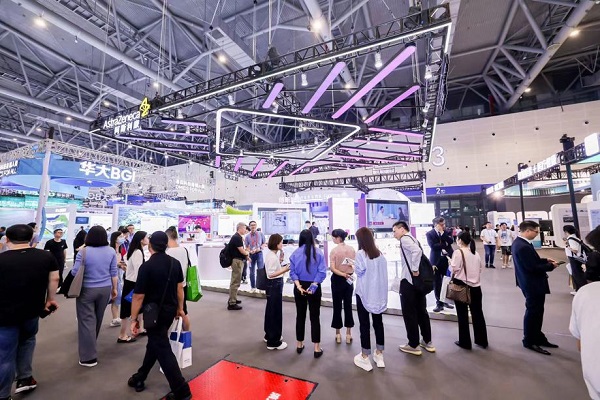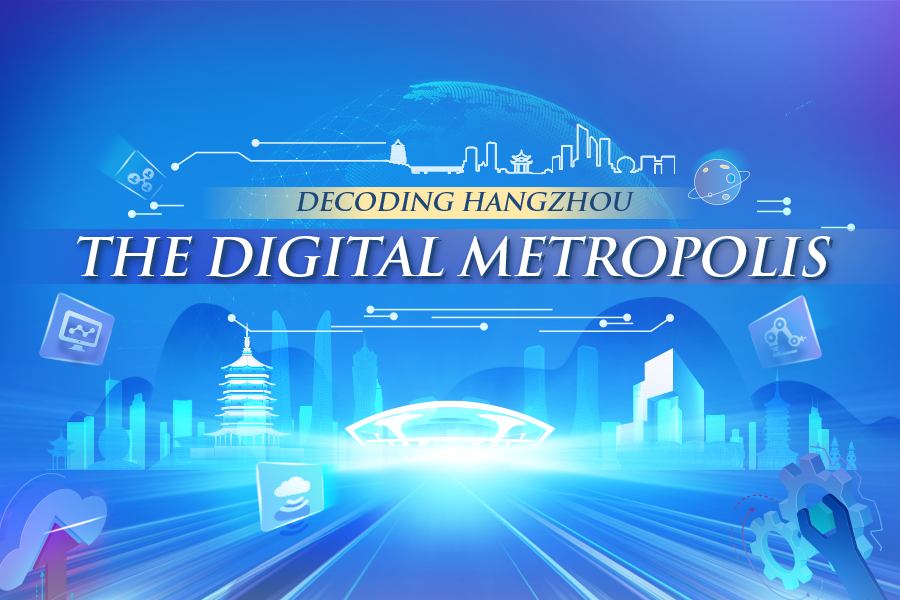Global medical giants eye China's growing digital trade

Global medical giants gather at the Digital Medicine Zone of the third Global Digital Trade Expo. [Photo provided to chinadaily.com.cn]
In recent years, new technologies such as artificial intelligence, big data, and telemedicine have been rapidly advancing, making them one of the most important components of global digital trade.
To tap this growing sector, the third Global Digital Trade Expo opened in Hangzhou on Wednesday, with global medical giants gathering at the Digital Medicine Zone.
As a leading company in the global pharmaceutical industry, AstraZeneca has participated in the Global Digital Trade Expo for the third consecutive year. Zhu Lili, vice-president of AstraZeneca China, said, "We are very firm in the belief that digital intelligence is a trend, and it is evolving rapidly. We must embrace and keep up with it quickly. To achieve digital intelligence, we need to deeply integrate and co-create with industry digital technologies."
At this year's expo, AstraZeneca showcased its latest achievements in the digital healthcare industry in collaboration with partners across various sectors, including government, industry, academia, research, and healthcare. A highlight was the launch of the first New Customer Engagement Platform (NCEP) in collaboration with Tencent Healthcare, reshaping pharmaceutical enterprises' interaction experience with professionals such as doctors to enhance interaction quality, efficiency, and business insights, driving industry transformation through digital technology. Zhu said that AstraZeneca has already established 10 AI business application scenarios, such as the collaboration with Alibaba Cloud, to create industry-level large language models and exploring new paradigms, such as using AI, to write adverse reaction summaries.
"Adverse reaction reporting is highly valued in the pharmaceutical sector worldwide. The AI adverse reaction summary tool we developed with Alibaba Cloud has achieved an accuracy rate of 95 percent and increased efficiency by 300 percent," Zhu said.
At the expo, BGI has also brought a series of innovative technologies and applications in the fields of data storage, cell storage, and more. DNA storage is a typical example of the integration of information technology and biotechnology, whose storage density far exceeds existing silicon-based media by more than 6 orders of magnitude. Each gram of DNA can store 455EB of data. The DNA storage box showcased by BGI Group integrates its self-developed CycloneSEQ nanopore gene sequencing device, capable of efficiently recovering original data by rapidly sequencing and interpreting DNA molecules that carry digital information on the storage chips. This provides a complete solution for interpreting files stored in DNA.
Two years ago, BGI Group expanded its presence in Hangzhou by establishing the BGI-Research Hangzhou and signed project agreements at the first Global Digital Trade Expo. Liu Longqi, chief representative of the eastern region at BGI Group and chief scientist of BGI-Research, said, "Currently, BGI-Research Hangzhou has developed an integrated strategy of academics, research and industry. It has focused on areas such as nanopore sequencing technologies, aging related studies, cellular interventions, neuroscience, synthetic biology, precision medicine, and public health. In the future, it will continue to drive breakthroughs in precision medicine and applications for precision health through cutting-edge scientific advancements, contributing to the healthcare development of Zhejiang."
AstraZeneca's Zhu noted that Hangzhou is one of the pharmaceutical giant's five major regional headquarters, focusing on digital healthcare. This theme aligns well with the theme of the Global Digital Trade Expo hosted by Zhejiang province. In the future, AstraZeneca will also drive more digital healthcare-related companies to develop together in this direction.
The Digital Medicine Zone at this year's expo focuses on the application of artificial intelligence in the medical sector. Over 80 well-known companies and industrial clusters, including AstraZeneca, BGI, Pfizer China, Siemens, Tencent, are participating in the expo.
-
Special: Third Global Digital Trade Expo
September 27, 2024
-
Hangzhou prepares to welcome guests for 3rd Global Digital Trade Expo
September 23, 2024
-
Hangzhou welcomes 3.8 million tourists during Mid-Autumn Festival
September 18, 2024
-
On board G8388: Lost in the Qiandao Lake — a unique aerial island maze
September 29, 2024



